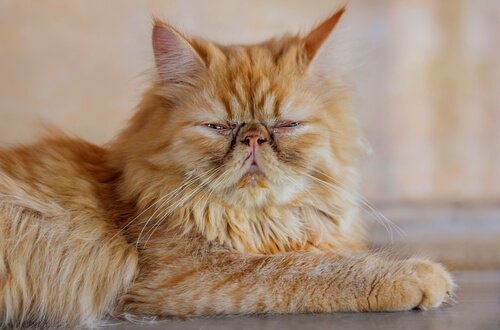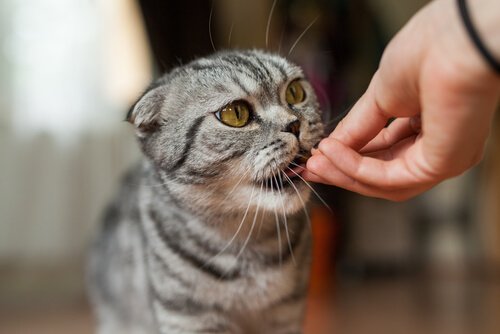Older Cats: 5 Tips for Taking Care of Older Cats

Having a pet is wonderful, but also is a big responsibility. Animals depend on us, they need our care and attention to live happy and healthy lives. However, after several years living with your pet, they will require more care than usual. In today article you can learn how to take care of older cats.
Deterioration in older cats

As they grow older, cats can suffer deterioration in their health, such as a loss of hearing, vision, and even start to lose their sense of smell. Therefore, as cats get older, they may need more attention and care so they can have a dignified old age.
Your pet accompanies you throughout their lives. Despite the legend that cats have 7 lives, it’s not true. They only have one and how long they live depends on how well they live.
So, what steps should you take at home to take care of older cats? Here are 5 tips that will help you care for older cats:
1. Monitor their diet
As the saying goes, we are what we eat. This is true in the case of older cats as well. An older cat won’t be able to eat the same food they did when they were younger. They will require nutrients and support that typical cat food won’t provide.
However, high-end brands provide a wide variety of food for all types of animals based on age. Choose food for older cats, which are full of proteins, phosphorus, and fats. These promote proper functioning of their body, as well as strengthening their immune system.
Also, the texture of the food is often tender, which makes it easier to chew.
2. Choose a good veterinarian
If your cat hasn’t had the same vet throughout their life, try to find one that is a specialist in cats and feline diseases.
Cats, unlike other pets, don’t express their pain. They are specialists in hiding their suffering. Therefore, you’ll need an expert in feline diseases to find out what is going on, even if your cat doesn’t show it.
This behavior of hiding diseases is instinctual. In the wild, a sick animal is weak and therefore easy prey. A good veterinarian familiar with cats will know when they are sick. Consequently, one of the essential rules of caring for older cats is periodic visits to the vet, at least two per year.
3. Maintain your cat’s oral hygiene
Older felines have a tendency of suffering gingivitis, an inflammation of the gums that can cause infections as well as loss of appetite. Vets recommend taking care of their oral hygiene at home with toothpaste and brushes, which is essential for preserving the health of older felines.
4. Take care of their fur
Their fur can be a reflection of the health of an older cat. Sometimes when there is internal damage, infections, or other health problems, your cat’s fur will reflect it.
You’ll be able to tell because their fur will lose its shine, vitality, and strength. In addition, it can start to fall out in excessive amounts. Age will also be something that can greatly influence the strength of an animal’s coat. Therefore, taking care of your cat’s fur at home is a good way to avoid major problems.
Nowadays you can find all kinds of products and vitamins that will help you care for your cat’s fur.
5. Don’t self-medicate older cats

You should never give an older cat human medicines or natural remedies that you think will work for your cat because they work for you.
After understanding this, the conclusion is more than clear. The only correct way to medicate an older cat is by following a veterinarian’s instructions. Then, add your love, patience, and affection.
Although it’s sad to see your pet aging day by day, it’s part of the cycle of life. You can also try to enjoy it too because your cat will need more love from you as time goes by. They’ll be grateful for all the attention.